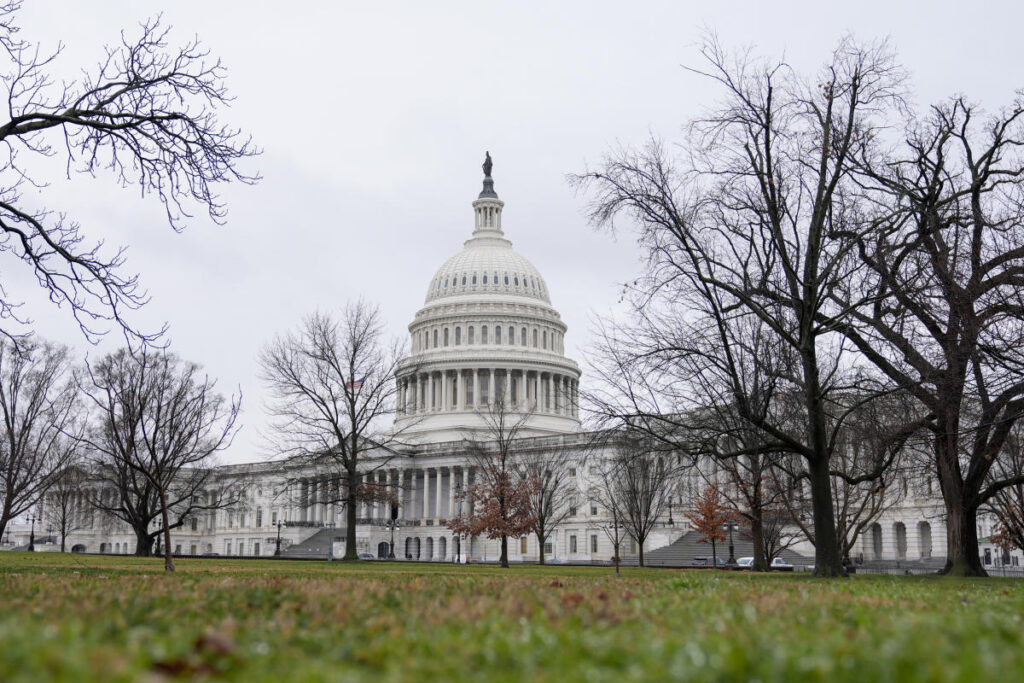WASHINGTON (AP) – President Joe Biden on Saturday signed a Senate-approved $460 billion spending bill on time to avert a shutdown of many major federal agencies. The bill's success allows lawmakers to complete appropriations for the 2024 budget year almost halfway.
The bill includes six annual spending bills and has already passed the House. In signing the bill, Biden thanked leaders and negotiators in both chambers for their efforts, and the White House said it would allow government agencies to “continue normal operations.”
Meanwhile, lawmakers are negotiating a second package of six bills, including defense, aimed at fully funding all federal agencies by the March 22 deadline.
“To those who worry that a divided government won't move us forward, this bipartisan package says otherwise,” Senate Majority Leader Chuck Schumer, R-N.Y., said Friday night. He said this after lawmakers passed the bill hours earlier.
He said the bill would allow for more air traffic controllers and railroad safety inspectors, pay raises for federal firefighters and more support for homeless veterans.
The Senate passed the bill by a vote of 75-22. Lawmakers asked for votes on several amendments and wanted to weigh in on the bill and other priorities during floor debate. It was unclear until midday whether senators would be able to avoid a brief shutdown, but there was no doubt that it would ultimately pass.
“I want to appeal to my colleagues to stop playing with fire here,” said Sen. Susan Collins, the top Republican member of the Senate Appropriations Committee. “It's irresponsible for us not to pass these bills and do the basic job of funding the government. What's more important?”
The vote comes after Congressional leaders relied on a series of stopgap bills to keep federal agencies funded for weeks or months more as they struggled to reach a deal on spending for the year. The move comes more than five months after the budget year began.
Ultimately, Congress's total discretionary spending is expected to be about $1.66 trillion for the entire budget year ending Sept. 30.
Republicans were able to keep non-defense spending relatively flat compared to the previous year. Supporters say it's progress at a time when federal deficits exceeding $1 trillion a year are commonplace. But many Republicans wanted deeper cuts and more policy wins.
The House Freedom Caucus, which includes dozens of the Republican Party's most conservative members, called on Republicans to vote against the first spending package and the second one being negotiated.
Democrats blocked most of the policy riders that Republicans tried to include in the package. For example, they blocked efforts to block new rules that would expand access to the abortion drug mifepristone. It was also able to fully fund nutrition programs for low-income women, infants, and children, providing about $7 billion for so-called WIC programs. This is an increase of $1 billion from the previous year.
However, Republicans were able to achieve some policy wins. One provision would prohibit the sale of oil in the Strategic Petroleum Reserve to China. Another policy mandate prohibits the Justice Department from investigating parents who exercise their free speech rights at local school board meetings.
Another provision would strengthen gun rights for certain veterans, but opponents say it could make it easier for people with very serious mental health conditions, such as dementia, to get guns. Stated.
“This is not a package that I would write alone,” said Sen. Patty Murray, the Democratic chair of the Senate Appropriations Committee. their daily life. ”
Sen. Rand Paul (R-Ky.) said one of the problems with the bill was that it made too many compromises, which led to overspending.
“A lot of people don't understand this. They think there's no cooperation in Washington, but the opposite is true. There are compromises every day in every spending bill.”
“This is a compromise between big government Democrats and big government Republicans,” he added.
Still, with a divided Congress and a Democratic-controlled White House, any bill that doesn't have support from members of both parties is unlikely to pass.
The bill also includes more than 6,600 projects requested by individual lawmakers, totaling about $12.7 billion. The plan drew criticism from some Republicans, but lawmakers from both parties broadly joined in the request, representing states and congressional districts. Paul called the spending “a kind of grease that saves billions and trillions of dollars.” Because by giving a little pork for your town and a little pork for your donors, you can get people to buy into the whole package. ”
But an effort by Sen. Rick Scott (R-Fla.) to scrap the project garnered only 32 votes, with 64 voting against it. Murray said Scott's efforts would negate “all the hard work and all the input we've asked you for on projects that will help our constituents.”
Even though lawmakers are passing spending bills five months into the budget year, Republicans have broken the cycle of passing all spending bills in one large package before lawmakers are called for a vote. Because there is little time to think about it, we frame it as a process that has been improved. Failure to do so risks a government shutdown. Still, some say splitting the funds into two bills is not a breakthrough.
The first package targets the Departments of Justice, Veterans Affairs, Agriculture, Interior and Transportation, among others.


